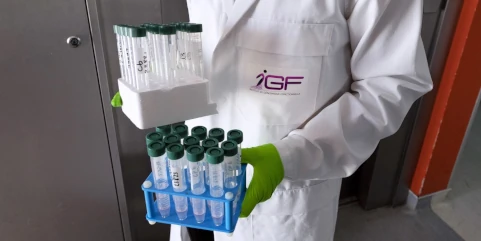Jobs

Would you like to join the dynamic teams at the IGF?
Staff on fixed-term contracts account for 48% of the Institute’s workforce. You will find below the positions for engineers, technicians, doctoral students, post-doctoral students and other positions open to recruitment.
No vacancies match what you’re looking for? Don’t hesitate to contact our researchers and department heads to submit your application!
/ Engineers
Biology Research Engineer (M/F)
30 months – Starting January 2, 2025
As a Research Engineer (RI) in Biology, the candidate will work on the preclinical validation of results obtained on cell cultures. The project, funded by the French National Cancer Institute (INCA), is being led by Julie PANNEQUIN from the Institut de Génomique Fonctionnelle (IGF – UMR 5203) in collaboration with a research team from the CRCL in Lyon. The candidate will be responsible for carrying out a range of specific techniques in biochemistry, cellular and molecular biology and animal experimentation.
/ Postdoc
Postdoctoral fellow (M/F) cell biologist
12 months – Starting March 1, 2025
Your aim will be to characterise the cross-talk between two GPCRs and their membrane environment. Your work will be based mainly on different photonic microscopy methods. You will also be required to characterise the function and pharmacology of the project’s GPCR targets.
/ Thesis
Thesis on the pharmacology of cardiac automatism M/F
3 years – Starting: 1 November 2024 – Deadline for applications: 26 September 2024
This thesis focuses on the study of molecules that modulate calcium-activated K+ channels SK4 and G protein-activated channels GIRK4. These molecules show a promising effect in suppressing atrial fibrillation and sinus dysfunction.
/ Other contracts
R&D Project Manager, development of medicinal bacteria for neurodegenerative diseases (M/F)
Open-ended contract – Start date: 1st half of 2025 – Deadline for applications: 1st July 2025
NBX BIOSCIENCES is an innovative company specialising in the design and management of short, medium and long-term research and development projects aimed at solving complex problems related to neurodegenerative diseases and brain disorders associated with inflammation.
Animal experimentation technician – Reserved for CNRS employees only
Internal mobility – Winter 2025 campaign – Deadline for applications: 16 January 2025
Working on a breeding and functional exploration platform, the candidate will carry out experiments on rodents in accordance with pre-established protocols, as part of the research projects of the teams using the platform. Depending on the needs of the department, he/she may also contribute to the breeding and maintenance of lines.


